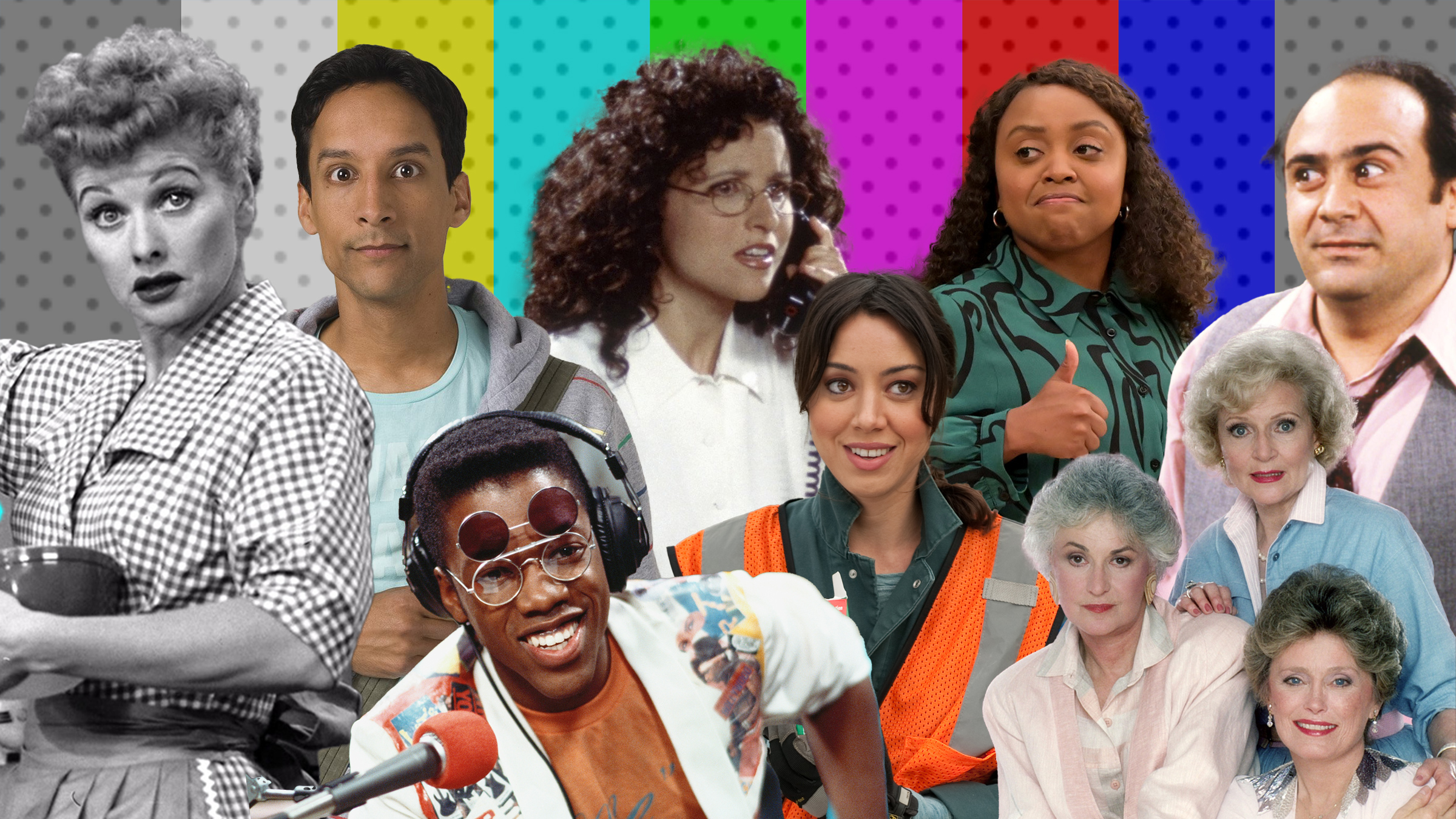There’s something uniquely satisfying about prime-time network comedies. Maybe it’s their self-contained nature, with most story lines introduced and resolved within a single episode. Maybe it’s their brevity, each half-hour studded with commercial breaks long enough to visit the kitchen or bathroom. Maybe it’s the comfort of entertainment conceived to elicit laughter from the broadest possible range of viewers. More likely, it’s all of the above.
Which is why, although they’ve dwindled in number and declined in quality since cable and streaming started to erode Big 5 broadcasters’ dominance over the market for original scripted programming, network sitcoms’ absence has been felt amid a fall TV season delayed by strikes. And while the WGA and SAG-AFTRA have both ratified new agreements with the AMPTP, it could still take months for Hollywood to start cranking out television at its usual pace.
With that in mind—and with holiday travel and downtime on the horizon—I’ve put together a sort of bucket list of network sitcoms, spanning from I Love Lucy through the present. Here are some caveats: I’m only including shows that are currently available to stream (sorry, WKRP in Cincinnati and Murphy Brown). There’s no animation (sorry, Simpsons and King of the Hill) because, in my opinion, that’s a different format entirely; the same goes for hour-long dramedies (sorry, Freaks and Geeks). Finally, this list is not a popularity contest. I only included titles that I enjoy enough to recommend. (Do you even need me to tell you The Office and Modern Family are streaming?)
I Love Lucy (CBS, 1951-1957)
Streaming on: Paramount+, Pluto TV (2 seasons, with ads)
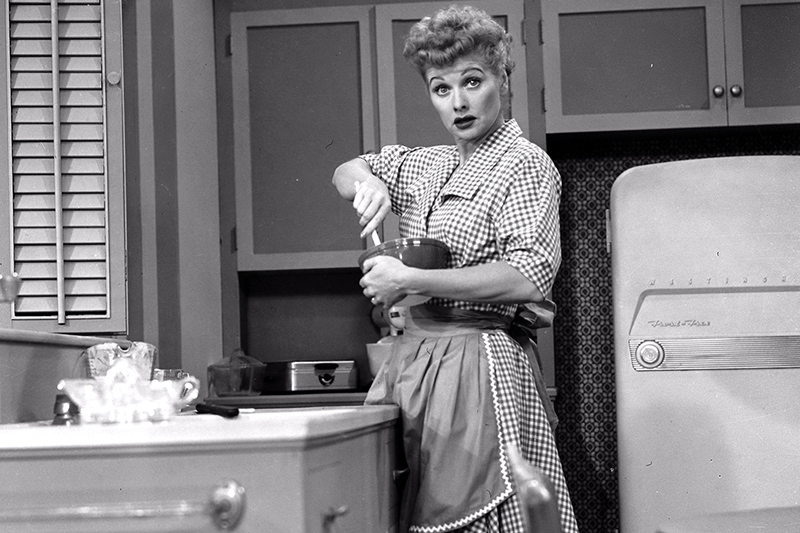
The series that essentially invented the TV sitcom, I Love Lucy broke ground with its depiction of an interracial marriage and extinguished an absurd taboo around visibly pregnant women appearing on screen. But the show isn’t just an important artifact. Seven decades later, Lucille Ball’s daffy wannabe star and Desi Arnaz’s long-suffering band leader are as funny as ever.
The Honeymooners (CBS, 1955-1956)
Streaming on: Pluto TV (with ads)
Jackie Gleason starred as the bellowing Brooklyn bus driver Ralph Kramden, who’s forever berating his poor wife Alice (Audrey Meadows), in this pioneering working-class sitcom. Watch because Gleason’s hilariously irritable performance set the bar for TV comedy—and because it set an archetype that’s been with us ever since, from The Flintstones to The King of Queens.
The Addams Family (ABC, 1964-1966)
Streaming on: Roku Channel (with ads), Pluto TV (with ads), Freevee (with ads)
Among the supernatural farces that dominated the ’60s sitcom scene, from I Dream of Jeannie to Bewitched to The Munsters, none has endured like this family comedy adapted from Charles Addams’ New Yorker cartoons. A pair of cult-classic movies revived Gomez, Morticia, and the whole monstrous clan in the ’90s. And now that Netflix’s Wednesday is one of the biggest shows in the world, there’s no better time to introduce its young fans to the original series.
The Mary Tyler Moore Show (CBS, 1970-1977)
Streaming on: Hulu
As second-wave feminists stormed the academy and took to the streets, Mary Tyler Moore—fresh off a career-making role as a young stay-at-home mom on The Dick Van Dyke Show—brought a gentler vision of women’s lib to prime time. A single career girl building a life for herself in Minneapolis in the aftermath of a broken engagement, Moore’s Mary Richards became an avatar for any woman whose aspirations transcended the domestic realm. The show boasted an ideal ensemble, as well, with Ed Asner’s gruff newsman Lou Grant and Valerie Harper’s street-smart city girl Rhoda Morgenstern balancing out Mary’s Midwestern sweetness.
All in the Family (CBS, 1971-1979)
Streaming on: Freevee (with ads), Pluto TV (with ads)
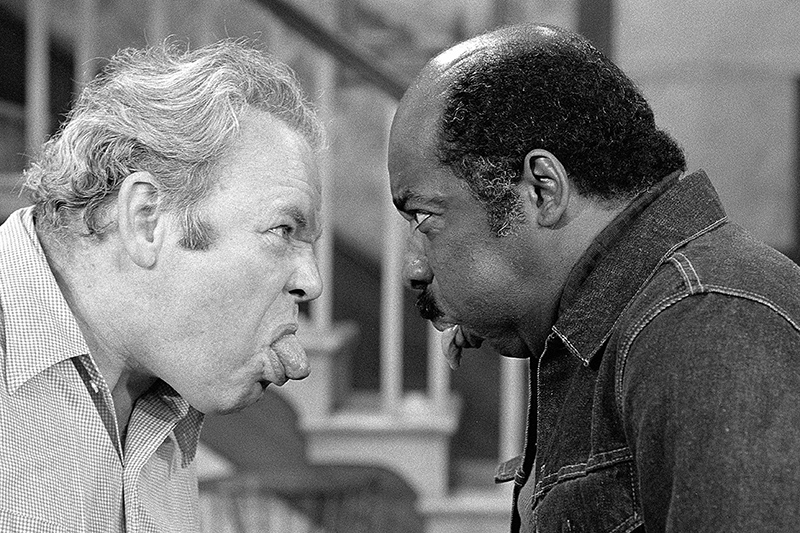
The late, great Norman Lear used the sitcoms he created, from Maude to One Day at a Time, to get people talking—and none started more conversations than his masterpiece, All in the Family. The quintessential ’70s comedy pitted Carroll O’Connor’s bigoted and belligerent patriarch Archie Bunker against a hippie generation represented by his daughter Gloria and her husband Mike, a.k.a. Meathead, as well as his upwardly mobile Black neighbors, the Jeffersons. (More on them below.) Five decades later, the show is an artifact of a time of great social change, when it was still possible for Americans to hash out their differences and change each other’s minds.
The Bob Newhart Show (CBS, 1972-1978)
Streaming on: Amazon
“I didn’t have a lot of demands,” Bob Newhart recalled in The Hollywood Reporter’s oral history of his classic comedy. “I just didn’t want the show to be where dad’s a dolt that everyone loves, who gets himself into a pickle and then the wife and kids huddle together to get him out of it.” Instead, the sophisticated sitcom cast the stand-up as an unassuming psychologist driven to distraction by the eccentrics around him, both in and out of the office. His follow-up, Newhart, is also streaming and also worth your time.
M*A*S*H (CBS, 1972-1983)
Streaming on: Hulu
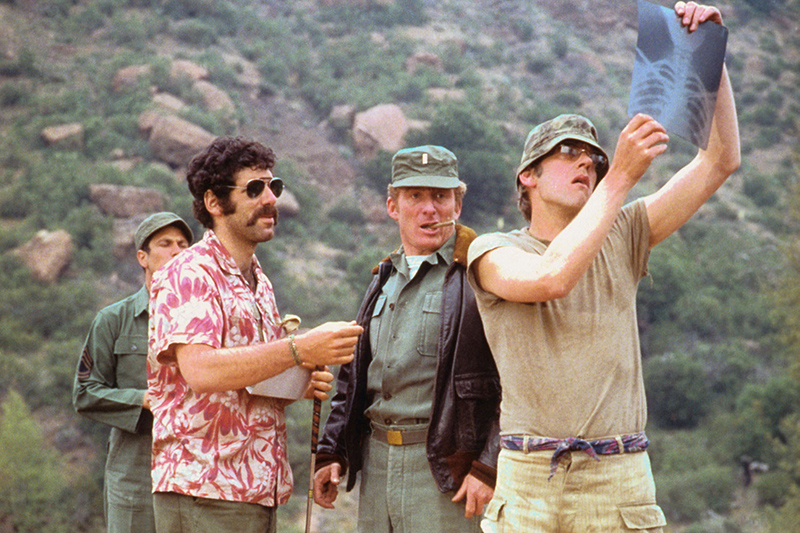
As the U.S. fought an increasingly unpopular war in Vietnam, Americans flocked to this sharp satire set at a Korean War field hospital where surgeons took on the Sisyphean task of healing troops who’d return directly to the front lines as cannon fodder. One of the most popular series of its time—famously, over 100 million people tuned in to the finale—it was also unusually dark for a sitcom. As M*A*S*H star Alan Alda, explained decades later, “the night before we started rehearsing the pilot, I wanted us all to agree that we wouldn’t just have high jinks at the front. That it would take seriously what these people were going through. The wounded, the dead.”
Sanford and Son (NBC, 1972-1977)
Streaming on: Peacock, Pluto TV (2 seasons, with ads)
When Norman Lear and collaborator Bud Yorkin caught Redd Foxx’s stand-up set in Las Vegas, they knew they had to work with him—that is, if they could get him to tone down his notoriously profane comedy for TV. The opportunity to do so came in the form of Sanford and Son, an adaptation of a British comedy that played Foxx’s cranky shyster Fred Sanford off of his responsible, ingenuous son and junk-shop business partner, Lamont (Demond Wilson). A sitcom about a Black family created by two white men, the show’s legacy is complicated. But it changed the Caucasian face of early-’70s prime time. And, of course, Foxx was uproarious in it.
Happy Days (ABC, 1974-1984)
Streaming on: Amazon (10 seasons), Paramount+ (1 season)
I’m not saying you have to watch all of this long-running teen comedy that capitalized on older boomers’ nostalgia for their ’50s childhoods. It is, after all, the show whose descent into inanity inspired the expression “jumping the shark.” But to fully comprehend such quintessentially American phenomena as the teenager, Weezer’s “Buddy Holly” music video, and national treasure Henry Winkler, you’ve got to at least acquaint yourself with Happy Days.
The Jeffersons (CBS, 1975-1988)
Streaming on: Amazon (9 seasons), Pluto TV (2 seasons)
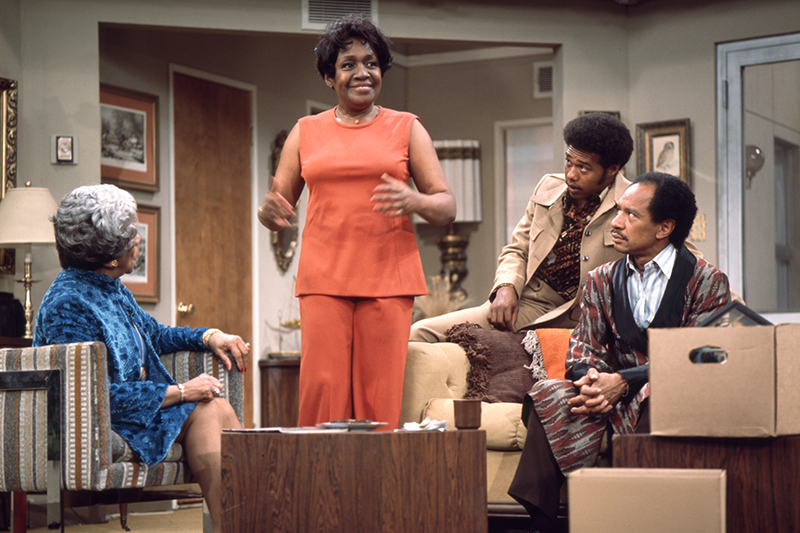
Created, in part, as a response to critics of Sanford and Sons and another Lear hit, Good Times, who complained that TV failed to depict prosperous African Americans, The Jeffersons followed Archie Bunker’s neighbors George and Weezy from working-class Queens to the Upper East Side. Sherman Hemsley and Isabel Sanford’s performances as the eponymous couple are iconic, and the series’ perceptive portrait of a wealthy Black family paved the way for standout comedies from The Cosby Show (which is no longer streaming, for obvious reasons) to The Fresh Prince of Bel-Air to Black-ish.
Taxi (ABC, 1978-1982; NBC, 1982-1983)
Streaming on: Paramount+, Pluto TV (with ads), Freevee (with ads)
This Emmy-magnet sitcom set at a Manhattan taxi garage thrived on the energy of its excellent cast. Judd Hirsch, Tony Danza, Marilu Henner, Jeff Conaway, and Christopher Lloyd played cabbies with big dreams. Danny DeVito was their slimy dispatcher. Andy Kaufman filled the wildcard role as an eccentric car mechanic from a generic foreign land—and, in the show’s final years, Carol Kane joined the troupe as his countrywoman and eventual wife. Kaufman’s Latka hasn’t aged especially well as a depiction of New York’s immigrant population, but the comedian’s Chaplin-esque physical humor will still make you laugh.
Cheers (NBC, 1982-1993)
Streaming on: Paramount+, Hulu (4 seasons)
Quite possibly the greatest sitcom of all time, Cheers had everything: charismatic leads, spiky supporting actors, the best will-they-or-won’t-they in the history of TV, and an endlessly flexible setting in which anyone could—and often did—walk in and take any episode in an unexpected direction. The cast achieved perfect comedic chemistry. And even though it morphed into something new once Kirstie Alley replaced Shelley Long, the show remained solid for nearly its entire 11-season run.
The Golden Girls (NBC, 1985-1992)
Streaming on: Hulu
A comfort-TV classic, this hangout comedy about four senior single ladies sharing a house in Miami revolutionized the way Americans viewed older women—and made its AARP-eligible cast into pop-cultural icons. Bea Arthur, Betty White, Rue McClanahan, and Estelle Getty are all spectacular. And the show has aged remarkably well, with groundbreaking episodes that touched on then-controversial subjects like menopause, queerness, and HIV/AIDS.
Designing Women (CBS, 1986-1993)
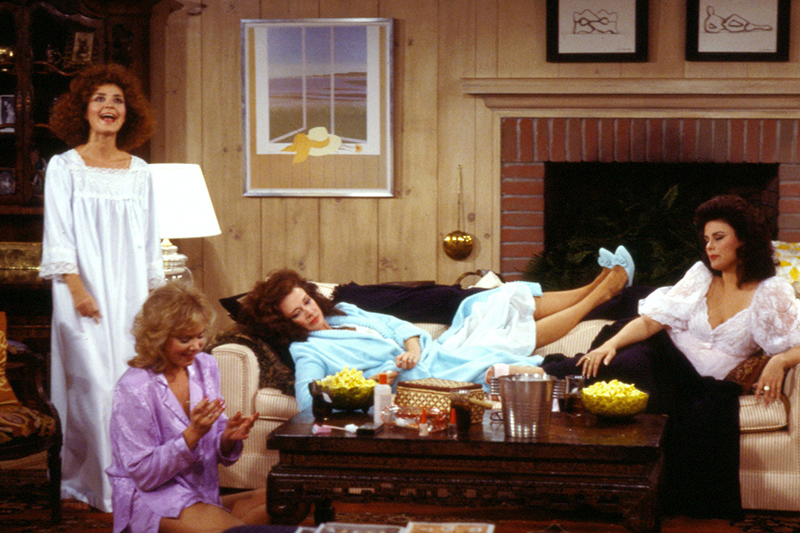
Widely seen, in its day, as a sort of junior Golden Girls, this sitcom set at an Atlanta interior-design firm could just as easily have been titled Women Talking. For seven envelope-pushing seasons, the central quartet of women—and their ex-con delivery man turned partner (Meshach Taylor)—gathered at Sugarbaker & Associates’ tastefully appointed offices to sound off on the hot topics of the day. Jean Smart might be the cast’s biggest name in 2023, but Dixie Carter’s opinionated Julia Sugarbaker was a heroine for the ages, and Delta Burke, as Julia’s self-absorbed younger sister Suzanne, never failed to deliver scene-stealing comic relief.
A Different World (NBC, 1987-1993)
Streaming on: Max
Regardless of how you feel about The Cosby Show’s disappearance from streaming, it’s an unequivocally good thing that this spin-off remains readily available. Originally the story of Denise Huxtable’s (Lisa Bonet) matriculation at her parents’ HBCU alma mater, the show shifted focus when a pregnant Bonet departed after Season 1, to spotlight Denise’s prim nemesis Whitley Gilbert (Jasmine Guy) and, under the guidance of executive producer Debbie Allen, explore such timely issues as safe sex, intimate partner violence, and the L.A. riots.
Roseanne (ABC, 1988-1997)
Streaming on: Peacock
Roseanne Barr wasn’t always a right-wing gadfly with a penchant for racist tweets. Way back in the waning years of the 20th century, her classic sitcom about a rude but loving blue-collar family offered a rare depiction of working-class Americans pulling together to survive an economy stacked against them. As a bonus, it put John Goodman and Laurie Metcalf on our TVs every week. The abortive MAGA-era revival, though? That is a very different story.
Seinfeld (NBC, 1989-1998)
Streaming on: Netflix
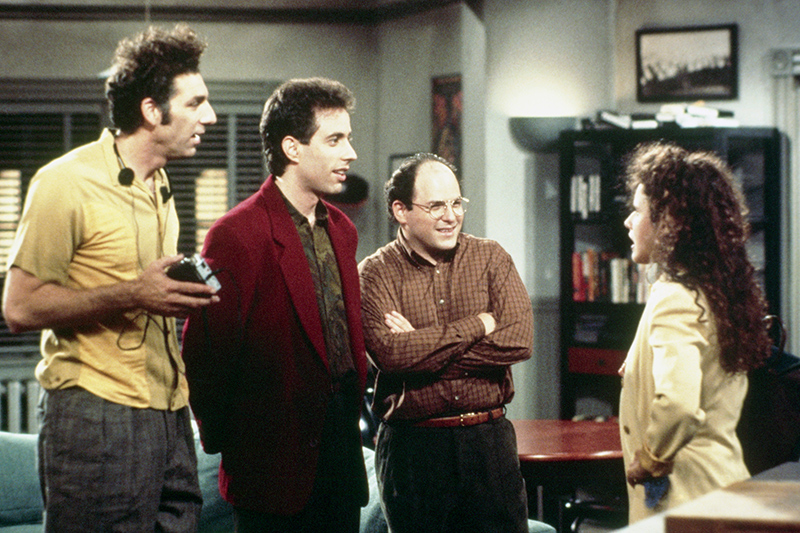
The “show about nothing,” as Jerry Seinfeld’s era-defining sitcom claimed to be, is really a show about everything—all the seemingly trivial conflicts and inconveniences that are the stuff of everyday life. Seinfeld played the dry, journeyman-comedian sounding board to a cast of narcissistic oddballs who have since become archetypes. Everyone knows a George Costanza or an Elaine Benes. And every New Yorker has, at least once, met a Cosmo Kramer.
The Fresh Prince of Bel-Air (NBC, 1990-1996)
Streaming on: Hulu, Max, Paramount+
What began as a vehicle for a wholesome young rapper quickly became Will Smith’s ticket to the highest echelon of Hollywood stardom. And you can see why. Smith gives one of the era’s most charming performances as a street-wise Philly kid sent to live with his aunt and uncle’s straitlaced family in one of the toniest zip codes in the country. Also great: the late James Avery as Will’s fearsome but loving Uncle Phil.
Frasier (NBC, 1993-2004)
Streaming on: Hulu, Paramount+
Like so many iconic sitcoms of the ’90s, this wildly popular Cheers spinoff that situates effete psychiatrist and erstwhile barfly Frasier Crane as a Seattle radio host has returned to television. Unfortunately, this fall's Paramount+ revival, which abandons most of the classic cast in favor of new characters who are pale imitations of their predecessors, is pretty awful. Best to revisit the original instead, which thrives on the chemistry and friction between such delightful personalities as Frasier’s splendidly snobby brother Niles (David Hyde Pierce); their no-nonsense ex-cop dad, Martin (the late John Mahoney); and Martin’s effervescent nurse, Daphne (Jane Leeves).
Living Single (Fox, 1993-1998)
Streaming on: Max
Before Friends, there was legendary producer Yvette Lee Bowser’s Living Single, a beloved hangout comedy that chronicled the lives of six young, Black professionals in a Brooklyn brownstone. Cool, smart, and blessed with an iconic cast including Queen Latifah, Kim Fields, and Erika Alexander, it was the rare show that cared as much about its female characters’ burgeoning careers (Latifah’s Khadijah runs her own magazine) as it did about their love lives.
The Nanny (CBS, 1993-1999)
Streaming on: Max
Yes, Fran Drescher was back in the spotlight this year as SAG-AFTRA's firebrand president. But some of us have never forgotten her career-defining role as a chatty, gloriously nasal Flushing hairdresser who accidentally becomes the nanny to a trio of uptight uptown kids—and slowly wins the heart of their Broadway-producer dad. It’s class-conscious comedy delivered in the most lighthearted fashion, from the rarely represented perspective of a working-class Jewish bombshell.
Friends (NBC, 1994-2004)
Streaming on: Max
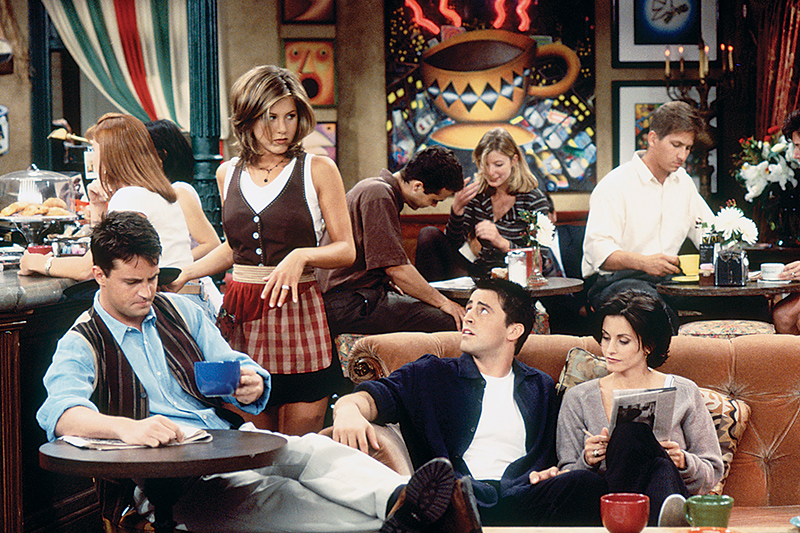
Truth be told, I don’t love Friends with the same passion as so many of my millennial peers. Ross and Rachel were truly no Sam and Diane. But the show about a coed clique in Manhattan has become an essential text of the ’90s, and like everyone else who grew up in that decade, I do love the ’90s. And in syndication, it remains a beacon amid linear TV schedules larded with game shows and infomercials.
Just Shoot Me! (NBC, 1997-2003)
Streaming on: Hulu, Pluto TV (2 seasons, with ads)
The unsung hero of NBC’s powerhouse ’90s Must See TV lineup, Just Shoot Me! cast the wonderful George Segal as the womanizing, old-school publisher of a fashion magazine, who hires his crusading daughter (Laura San Giacomo) after she sabotages her nascent career as a serious journalist. The show is, for better or worse, a relic of its postfeminist moment. But its sophisticated sendup of women’s media and a cast featuring Wendie Malick, Enrico Colantoni, David Spade, and Brian Posehn more than make up for the occasional groan-worthy joke.
The Bernie Mac Show (Fox, 2001-2006)
A collaboration between celebrated stand-up Bernie Mac and creator Larry Wilmore, this Peabody-winning family sitcom cast Mac and Kellita Smith as a childless married couple who suddenly acquire three kids when Bernie’s sister checks into rehab. While our hero’s approach to child-rearing could be harsh, his heart was ultimately in the right place. And scenes that had Bernie narrating each episode’s story directly into the camera gave Mac, who would die tragically young just two years after the show wrapped, a chance to repurpose his popular act.
Arrested Development (Fox, 2003-2006)
Streaming on: Netflix
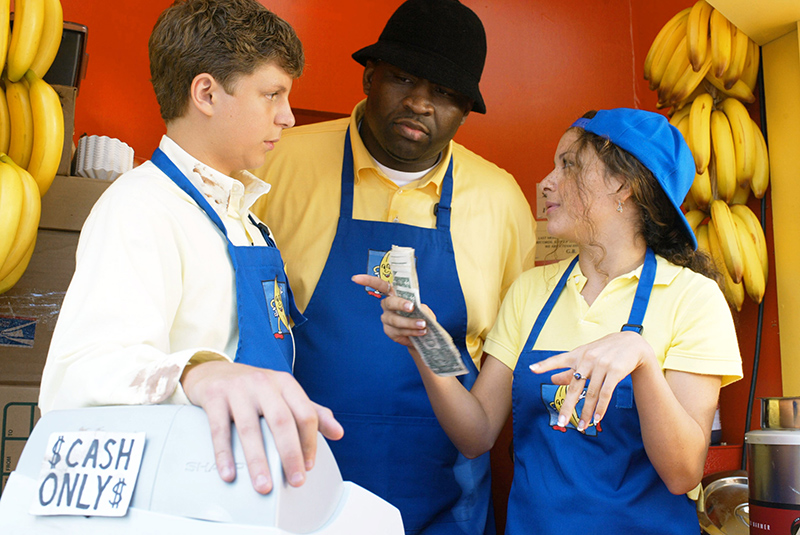
Wait, you might ask, didn’t Netflix revive Arrested Development for a couple seasons in the 2010s? To which I would respond: Shhhh. Let’s pretend there were only ever three perfect seasons of Mitchell Hurwitz’s deeply weird, pioneeringly single-camera sitcom about a wealthy family thrown into crisis when its real-estate developer patriarch (Jeffrey Tambor) is sent to prison for his misdeeds. Bringing together Hollywood veterans, alt-comedy upstarts, and young newcomers who went on to become marquee stars, namely Michael Cera and Alia Shawkat, the show’s cast was one of the very best ever assembled under one dysfunctional roof.
30 Rock (NBC, 2006-2013)
Tina Fey left SNL to make this brilliantly wacky sitcom set amid the behind-the-scenes mayhem of a weekly sketch show. Fueled by the wonderfully nonsexual tension between Fey’s harried, quasi-feminist showrunner Liz Lemon and Alex Baldwin’s alpha-conservative network exec Jack Donaghy—and the self-absorbed antics of actors played by Jane Krakowski and Tracy Morgan—30 Rock careened from one high-concept joke and perfectly placed guest star to the next. In doing so, it ushered in a new era of quirky, referential, single-camera comedies on NBC.
Community (NBC, 2009-2014; Yahoo!, 2015)
Streaming on: Netflix
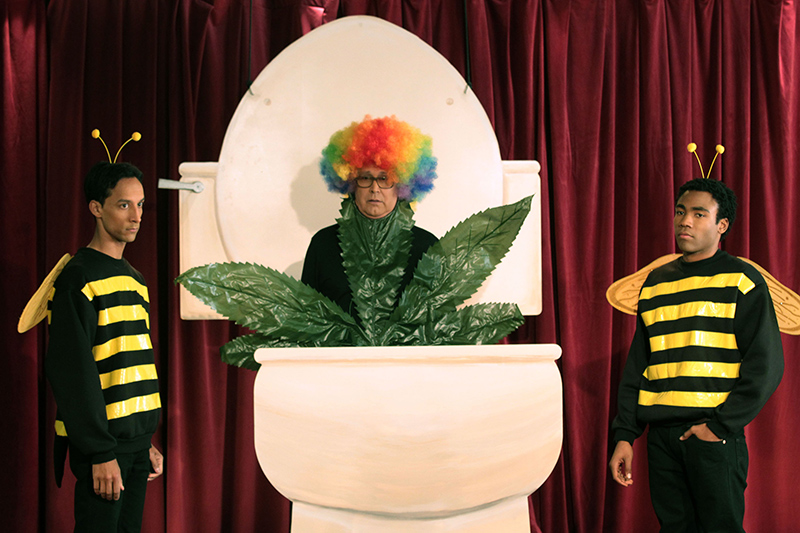
Even weirder and more pop-culture obsessed than 30 Rock, Dan Harmon’s shapeshifting comedy about a community-college study group remains one of network TV’s wildest bets. What began with Joel McHale’s shady lawyer character Jeff Winger going back to school after his firm realizes he never got his bachelor’s degree, quickly evolved into a surreal, self-referential cult classic complete with fully animated episodes, extended movie tributes, and a huge rotation of recurring characters. Remembered variously as a launchpad for Donald Glover, the originator of the perennially useful ”darkest timeline” concept, and, unfortunately, a minefield of abusive behavior on Harmon’s part, Community left an outsize footprint on the cultural landscape.
Parks and Recreation (NBC, 2009-2015)
Streaming on: Peacock
Perhaps the defining sitcom of the Obama era, Greg Daniels and Mike Schur’s paean to government bureaucrats feels a bit naive today. Still, it’s nice in small doses. Come for Amy Poehler as the compulsively competent Leslie Knope; stay for Leslie’s nerdy romance with Adam Scott, her life-affirming friendship with Rashida Jones, and career-making turns from Aubrey Plaza, Aziz Ansari, and Retta. The first season, which felt a bit too much like a clone of Daniels’ The Office, is skippable.
Happy Endings (ABC, 2011-2013)
Streaming on: Hulu, Roku Channel (with ads)
Released at a transitional moment for network TV, Happy Endings never really got the rollout it deserved. Thankfully, the three-season hangout comedy about six friends in Chicago has seen its reputation grow by word-of-mouth in the decade since it was prematurely canceled. Anchored by Damon Wayans Jr., Casey Wilson, and Adam Pally, it’s reminiscent of a more energetic Friends, or perhaps How I Met Your Mother without the tiresome central conceit.
New Girl (Fox, 2011-2018)
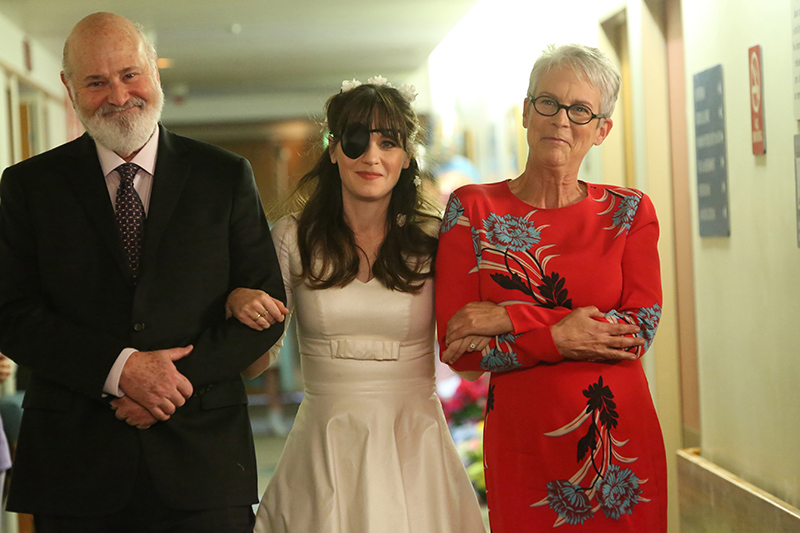
Zooey Deschanel threatened to kill us with cuteness in early episodes of this roommate comedy that paired her “adorkable” schoolteacher alter ego Jess Day with a loft full of male strangers. But the show soon evolved into a genuine ensemble sitcom, throwing Jess into a sparky, on-again-off-again romance with gruff bartender Nick (Jake Johnson) and fleshing out great characters like Max Greenfield’s toxic but secretly tender bro Schmidt and Lamorne Morris’ sweet, aimless Winston. Prince loved the show so much, he made a guest appearance.
Black-ish (ABC, 2014-2022)
An upper-middle-class Black family became the vehicle for weekly discussions of race and class in America in this long-running hit created by Kenya Barris. Episodes on the “N-word,” police violence against the Black community, and both the 2016 and 2020 presidential elections doubled as fodder for crucial multigenerational conversations. (Jenifer Lewis gives a particularly memorable performance as the spiky mother of Anthony Anderson’s Dre.) But the show also knew how to have fun, lightening the mood with family-friendly humor and adorable children.
The Last Man on Earth (Fox, 2015-2018)
Streaming on: Hulu
Community might’ve been the most offbeat network sitcom of the 2010s, but The Last Man on Earth certainly gave it a run for its money. Will Forte played an average Joe who survives an apocalyptic pandemic (in the year 2020, no less), believes he’s the only human left on Earth, and is consequently losing his mind. Slowly but surely, a cast of equally damaged oddballs assembles, featuring the likes of Kristen Schaal, January Jones, and several of Forte’s fellow SNL alums. If you like dark-edged, philosophical comedy, you’re in for a treat.
Superstore (NBC, 2015-2021)
When it comes to sitcoms, the white-collar office has always been a more popular setting than lower-wage workplaces—which isn’t exactly representative of the real, contemporary labor market. Set at a big-box store in the Walmart mold, Justin Spitzer’s service-industry comedy provided a refreshing alternative to TV’s horde of pencil pushers. Framed by the relationship between America Ferrera’s hypercompetent single-mom character and a business-school dropout played by Ben Feldman, Superstore didn’t just spotlight workers from all walks of life; it rolled up its sleeves and tackled issues ranging from immigration to unions to COVID.
The Good Place (NBC, 2016-2020)
Streaming on: Netflix
OK, so it wasn’t the very last great sitcom on network TV. But it’s hard to imagine a Big 5 broadcaster greenlighting another show as imaginative and intelligent as this afterlife comedy from Mike Schur, which cast Kristen Bell as a recently deceased sinner who finds herself in what a supernatural being played by Ted Danson assures her is heaven. A combination quest narrative, rom-com, and disquisition into moral philosophy, The Good Place also made stars of a hilarious ensemble cast including William Jackson Harper, Manny Jacinto, and D’Arcy Carden.
Abbott Elementary (ABC, 2021-present)
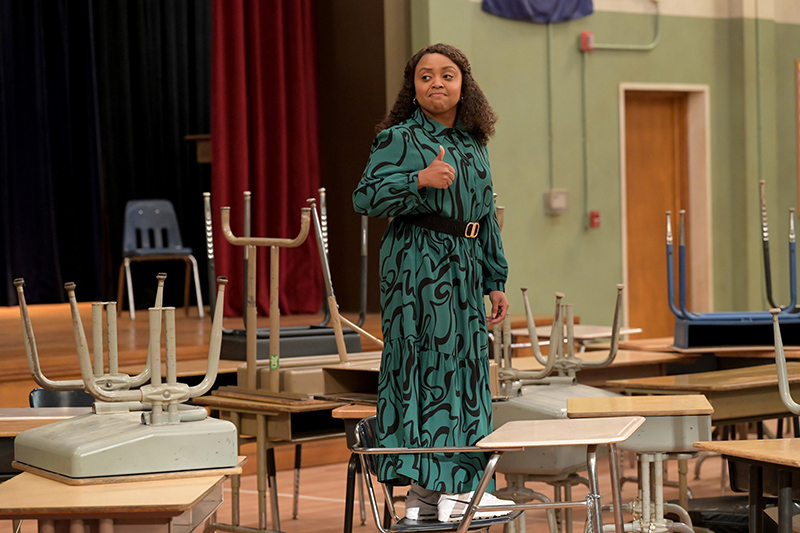
Is there really only one still-airing title worthy of this list? Unfortunately, yes. Fortunately, Abbott Elementary embodies everything worth celebrating about the prototypical network sitcom. Quinta Brunson’s love letter to the overworked, underpaid teachers who populate an under-resourced Philadelphia public school is kindhearted, politically engaged, laugh-out-loud funny, packed with wonderful performances, and genuinely for everyone.
More Must-Reads from TIME
- Cybersecurity Experts Are Sounding the Alarm on DOGE
- Meet the 2025 Women of the Year
- The Harsh Truth About Disability Inclusion
- Why Do More Young Adults Have Cancer?
- Colman Domingo Leads With Radical Love
- How to Get Better at Doing Things Alone
- Michelle Zauner Stares Down the Darkness
Contact us at letters@time.com
